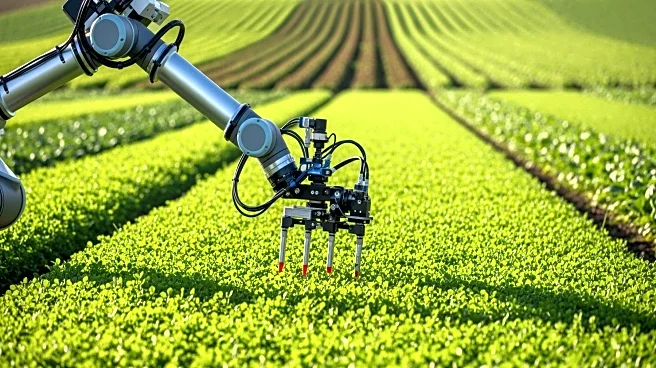What's Happening?
Artificial intelligence (AI) is increasingly being integrated into agriculture to address challenges such as labor shortages and the need for sustainable food production. AI technologies, including autonomous tractors and drones, are being developed to apply
fertilizers and herbicides precisely, thereby reducing chemical use and improving efficiency. These innovations are crucial as traditional farming methods struggle to cope with unpredictable weather patterns and shrinking resources. AI helps farmers by turning data from satellites, sensors, and past records into actionable predictions and recommendations, allowing for proactive management of planting and irrigation. This shift from reactive to predictive farming is essential for maintaining productivity and ensuring a steady food supply.
Why It's Important?
The integration of AI in agriculture is significant as it addresses critical issues like climate change, resource scarcity, and global food security. By enabling more efficient use of resources such as water and fertilizers, AI helps mitigate the environmental impact of farming. Additionally, AI-driven technologies can enhance crop yields and quality, which is vital for feeding a growing global population. The adoption of AI also supports economic sustainability for farmers by reducing costs and increasing income through better planning and market predictions. However, challenges such as high costs, connectivity issues, and digital literacy need to be addressed to ensure widespread adoption and equitable benefits.
What's Next?
For AI to fully transform agriculture, it must become more accessible and sustainable. This involves reducing the cost of AI technologies, improving rural connectivity, and enhancing digital literacy among farmers. Governments and organizations may need to provide subsidies and educational programs to facilitate this transition. Additionally, there is a need for strong data privacy protections and ethical frameworks to ensure that AI benefits all stakeholders in the agricultural sector. As AI continues to evolve, it is expected to play a crucial role in creating a more resilient and environmentally friendly agricultural system.
Beyond the Headlines
The adoption of AI in agriculture also raises ethical and cultural considerations. There is a need to balance technological advancements with traditional farming knowledge and practices. Ensuring that AI tools are available in local languages and are user-friendly can help bridge the gap between technology and farmers. Moreover, data ownership and privacy are critical issues that need to be addressed to build trust among farmers. By promoting regenerative practices and fair access to AI technologies, the agricultural sector can move towards a more sustainable and inclusive future.

















